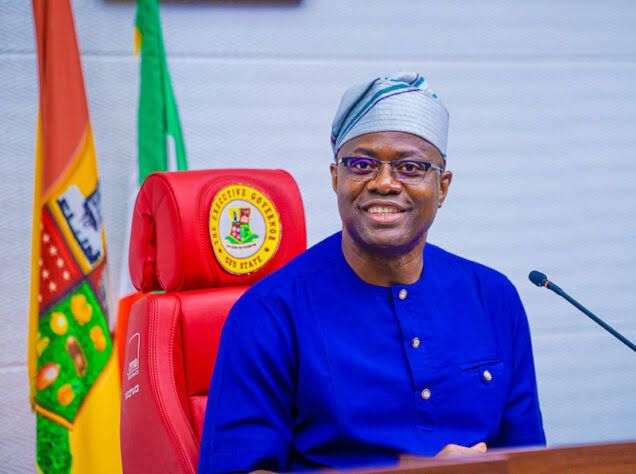Governor Seyi Makinde of Oyo State has described the exit of former Vice President of Nigeria, Alhaji Atiku from the People’s Democratic Party (PDP) as a good riddance to bad rubbish.
Makinde, who spoke with reporters after a colloquium to mark the 10th anniversary of Deji of Akure, Oba Aladetoyinbo Ogunlade Aladelusi, said it is better for anybody holding the PDP down to quit.
Speaking with reporters on the defection of Atiku from the PDP, Makinde said “Politics is a game of interest. I don’t think that his exit will make any dent on PDP as a party. PDP is an institution. We have freedom of entrance and exit. Anyone who holds PDP down, it is better for such an individual to quit.”
Dismissing the African Democratic Congress (ADC) as an alternative to the PDP, the Oyo State governor said, ” I don’t see ADC as a threat to PDP. The goal is about the same. If you are not happy about the tempo and pace of governance, you are free to associate and see what can be done. But one thing we must all realize is that players will come and go, governors will come and go, Presidents will come and go but our state and country will remain.”
Makinde, however, advocated constitutional roles for traditional rulers in the country to contribute meaningfully to the development of the community, state, and country. He said that with the constitutional roles, the monarch would be able to participate and contribute to the development of the nation.
According to him, his government has been collaborating with traditional institutions in his state and has been rewarded greatly from such collaborations. He said he has been pushing for constitutional roles for the monarchs so that they would not be kept floating.
In his speech at the colloquium titled, “The Role of Nigeria’s Traditional Institutions in Nation Building: Impediments, Impacts, and Prospects” Makinde said the role of traditional rulers has been misconstrued by the citizens as some see them as mere instruments of political endorsement while others imagine them as frail old men who have outlived their relevance.
The governor said traditional institutions are not relics of the past. Rather, they are enduring pillars of identity, legitimacy, and communal cohesion. He said traditional rulers have dispensed justice, upheld values, coordinated local security, and kept communities united long before Nigeria’s formal administrative systems took root
It is because of the relevance of the traditional rulers that politicians continue to seek their blessings and validation during elections.
His words “In my own public service journey, I have come to see that strengthening traditional institutions is not simply about cultural preservation — it is strategic governance.
“In Oyo State, we have taken deliberate steps to integrate our traditional institutions into the governance architecture. Permit me to highlight a few of these steps:
We institutionalised their role in the State Security Council. Our royal fathers are not bystanders. They serve as first responders, sources of local intelligence, and advocates for peace.
“We passed laws to remove ambiguity around succession and throne ascension. The outcome? Fewer legal battles, reduced communal tension, and enhanced legitimacy for our royal fathers.
Most critically, we do not interfere. We trust the custodians of tradition to manage their own succession processes. This principle of non-interference has fostered dignity, autonomy, and internal cohesion.
“This journey has not been without its challenges. Some of the impediments we continue to face include: Jurisdictional conflicts between traditional institutions and local government councils. We even have an ongoing conflict because we are reintroducing the Traditional Council, but I know we will overcome it.
Speaking on the impediment to the roles of traditional rulers, Makinde said “Lack of constitutional clarity, which leaves traditional rulers vulnerable to political goodwill rather than protected by a legal structure. Still, these challenges do not diminish the value of our traditional institutions. They simply point to the need for thoughtful reform and a more coherent national policy.
“Indeed, when respected and empowered, our traditional institutions deliver measurable impact: They help resolve conflicts at the community level, often preventing escalation to violence. In Oyo State, we have institutionalised alternative dispute resolution mechanisms that work hand-in-hand with our traditional institutions.
“They are vital to community policing. The Amotekun Corps has seen significant success partly because our traditional rulers support and mobilise their communities around the initiative.
They encourage development ownership. Many of our tourism sites in Oyo State— such as Iyake Lake and Idere Hills — are community-run under the stewardship of traditional leaders.
“The relevance of traditional institutions must be recalibrated, not politicised, but purposefully integrated into our broader development systems. That means as a nation: Reforming legal frameworks to provide clarity on the roles, rights, and recognition of traditional councils. Strengthening our security architecture to formalise community policing strategies rooted in traditional structures.
“Elevating cultural diplomacy and tourism, placing our traditional institutions at the heart of heritage, arts, and youth engagement.
In a country as richly diverse as Nigeria, we do not need fewer institutions. We need stronger, smarter partnerships — between the old and the new, between the traditional throne and the modern office, between the oba’s palace and the policies of the government.
“True nation-building is not about how much oil Nigeria produces — it is about the strength of our institutions, their ability to serve the people justly, and the legacy they leave behind.”
The celebrant, Oba Aladetoyinbo Ogunlade Aladelusi, advocated unity among Akure-speaking towns and villages. The monarch also prayed for the peace and development of the Indigenes and residents of the town.















